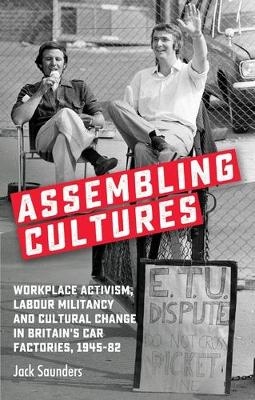
Assembling Cultures
Workplace Activism, Labour Militancy and Cultural Change in Britain's Car Factories, 1945-82
Seiten
2021
Manchester University Press (Verlag)
978-1-5261-5597-9 (ISBN)
Manchester University Press (Verlag)
978-1-5261-5597-9 (ISBN)
Assembling cultures charts the development of workplace activism in the British motor industry between 1945 and 1982. -- .
In British political discourse the idea that in the 1970s trade unions 'ran the country' has become a truism, a folk mythology invoked against the twin perils of socialism and strikes. But who exactly wielded power in Britain’s workplaces and on what terms?
Assembling cultures takes a fine-grained look at factory activism in the motor industry between 1945 and 1982, using car manufacturing as a key case for unpicking important narratives around affluence, declinism and class. It traces the development of the militant car worker stereotype and looks at the real social relations that lay behind car manufacturing’s reputation for conflict. In doing so, this book reveals a changing, complex world of social practices, cultural norms and shared values and expectations.
From relatively meagre interwar trade union traditions, during the post-war period car workers developed shop-floor organisations of considerable authority, enabling some to make new demands of their working lives, but constraining others in their more radical political aims. Assembling cultures documents in detail a historic process where, from the 1950s, groups and individuals set about creating and reproducing collective power and asks what that meant for their lives. This is a story of workers and their place in the power relations of post-war Britain.
This book will be invaluable to lecturers and students studying the history, sociology and politics of post-war Britain, particularly those with an interest in power, rationality, class, labour, gender and race. The detailed analysis of just how solidarity, organisation and collective action were generated will also prove useful to trade union activists. -- .
In British political discourse the idea that in the 1970s trade unions 'ran the country' has become a truism, a folk mythology invoked against the twin perils of socialism and strikes. But who exactly wielded power in Britain’s workplaces and on what terms?
Assembling cultures takes a fine-grained look at factory activism in the motor industry between 1945 and 1982, using car manufacturing as a key case for unpicking important narratives around affluence, declinism and class. It traces the development of the militant car worker stereotype and looks at the real social relations that lay behind car manufacturing’s reputation for conflict. In doing so, this book reveals a changing, complex world of social practices, cultural norms and shared values and expectations.
From relatively meagre interwar trade union traditions, during the post-war period car workers developed shop-floor organisations of considerable authority, enabling some to make new demands of their working lives, but constraining others in their more radical political aims. Assembling cultures documents in detail a historic process where, from the 1950s, groups and individuals set about creating and reproducing collective power and asks what that meant for their lives. This is a story of workers and their place in the power relations of post-war Britain.
This book will be invaluable to lecturers and students studying the history, sociology and politics of post-war Britain, particularly those with an interest in power, rationality, class, labour, gender and race. The detailed analysis of just how solidarity, organisation and collective action were generated will also prove useful to trade union activists. -- .
Jack Saunders is a Lecturer in Modern British History at University College London -- .
1 Introduction – Agency and subjectivity in post-war labour militancy
2 Car workers, trade union militancy and public discourse
3 Organising in car factories 1945-60
4 The social practices and cultural norms of “fragmentation”, 1960-68
5 Productivity bargaining and re-making workplace trade unionism, 1968-75
6 Towards “Strike Free”, 1975-82
7 Conclusion
Index -- .
| Erscheinungsdatum | 13.05.2021 |
|---|---|
| Zusatzinfo | 7 black & white illustrations |
| Verlagsort | Manchester |
| Sprache | englisch |
| Maße | 138 x 216 mm |
| Gewicht | 363 g |
| Themenwelt | Geschichte ► Allgemeine Geschichte ► Zeitgeschichte |
| Geisteswissenschaften ► Geschichte ► Regional- / Ländergeschichte | |
| Geschichte ► Teilgebiete der Geschichte ► Kulturgeschichte | |
| Sozialwissenschaften ► Politik / Verwaltung | |
| ISBN-10 | 1-5261-5597-4 / 1526155974 |
| ISBN-13 | 978-1-5261-5597-9 / 9781526155979 |
| Zustand | Neuware |
| Haben Sie eine Frage zum Produkt? |
Mehr entdecken
aus dem Bereich
aus dem Bereich
Gewalt, Umwelt, Identität, Methode
Buch | Softcover (2024)
Spector Books OHG (Verlag)
36,00 €
der Osten, der Westen, der Zorn und das Glück
Buch | Hardcover (2024)
S. Fischer (Verlag)
26,00 €
die Deutschen und ihre Demokratie seit den 1980er-Jahren
Buch | Hardcover (2023)
Siedler (Verlag)
28,00 €


